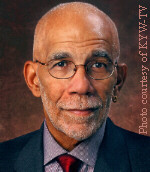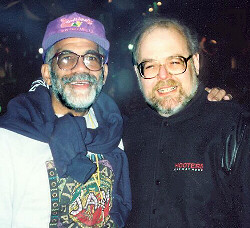

![]()
Gerry Wilkinson, President of the Broadcast Pioneers and former Operations Manager of WDAS Radio tells this story which he heard from "The Guy with the Goods, Georgie Woods.
Ed got interested in broadcasting because of Georgie Woods, a member of our Hall of Fame. George went to speak at Cheney College where Bradley was a student. After listening to Woods, Bradley thought that broadcasting might have a place for him.
He started hanging around WDAS. One time, there was an opening in the news department and they let Ed do one newscast. He wasn't bad so they let him do more and eventually, they gave up looking for someone else and hired Bradley on a permanent basis. He learned quickly and his skills became very polished. He went from an unskilled beginner to one of the top news people in the city. That's how Ed Bradley got into broadcasting.
The 2006-07 season marked Ed Bradley's 26th year on 60 MINUTES. He joined the broadcast during the 1981-82 season. He also anchored and reported hour-long specials.
Bradley's consummate skills as a broadcast journalist and his distinctive body of work have been recognized with numerous awards, including 19 Emmys, the latest for a segment that reported the reopening of the 50-year-old racial murder case of Emmett Till. He was honored with the Lifetime Achievement award from the National Association of Black Journalists. Three of his Emmys came at the 2003 awards: a Lifetime Achievement Emmy; one for a 60 MINUTES report on brain cancer patients, "A New Lease on Life" (April 2002); and another for his hour on 60 MINUTES II about sexual abuse in the Catholic Church, "The Catholic Church on Trial" (June 2002).

Ed Bradley & Ed Sciaky
May 1992
Bradley's 60 MINUTES interview with condemned Oklahoma City bomber Timothy McVeigh (March 2000) was the only television interview ever given by the man guilty of one of the worst terrorist acts on American soil; it also earned Bradley an Emmy. His reporting on the worst school shooting in American history, "Columbine" (April 2001), revealed on 60 MINUTES II that authorities ignored telling evidence with which they might have prevented the massacre. Other hourlong reports by Bradley have prompted praise and action: "Death by Denial" (June 2000) won a Peabody Award for focusing on the plight of Africans dying of AIDS and helped convince drug companies to donate and discount AIDS drugs; "Unsafe Haven" (April 1999) spurred federal investigations into the nation's largest chain of psychiatric hospitals; and "Town Under Siege" (December 1997), about a small town battling toxic waste, was named one of the Ten Best Television Programs of 1997 by Time magazine.
Bradley's significant contribution to electronic journalism was also recognized by the Radio/Television News Directors Association when it named him its Paul White Award winner for 2000. He joined other distinguished journalists, such as Edward R. Murrow, Walter Cronkite and Peter Jennings, as a Paul White recipient. The Denver Press Club awarded him its 2003 Damon Runyon Award for career journalistic excellence. Another prestigious honor received by Bradley is the Robert F. Kennedy Journalism Awards grand prize and television first prize for "CBS Reports: In the Killing Fields of America" (January 1995), a documentary about violence in America, for which he was co-anchor and reporter.
His work on 60 MINUTES has gained much recognition, including a George Foster Peabody Award for "Big Man, Big Voice" (November 1997), the uplifting story of a German singer who became successful despite birth defects. In 1995, he won his 11th Emmy Award for a 60 MINUTES segment on the cruel effects of nuclear testing in the town of Semipalatinsk, Kazakhstan, a report that also won him an Alfred I. duPont-Columbia University Award in 1994. Also in 1994, he was honored with an Overseas Press Club Award for two 60 MINUTES reports that took viewers inside sensitive military installations in Russia and the United States.
In 1985, he received an Emmy Award for "Schizophrenia," a 60 MINUTES report on that misunderstood brain disorder. In 1983, two of Bradley's reports for 60 MINUTES won Emmy Awards: "In the Belly of the Beast," an interview with Jack Henry Abbott, a convicted murderer and author, and "Lena," a profile of singer Lena Horne. He received an Alfred I. duPont-Columbia University Silver Baton and a 1991 Emmy Award for his 60 MINUTES report "Made in China," a look at Chinese forced-labor camps, and another Emmy for "Caitlin's Story" (November 1992), an examination of the controversy between the parents of a deaf child and a deaf association.
In addition to "In the Killing Fields," his work for "CBS Reports" has included: "Enter the Jury Room" (April 1997), an Alfred I. duPont-Columbia University Award winner that revealed the jury deliberation process for the first time in front of network cameras; "The Boat People" (January 1979), which won duPont, Emmy and Overseas Press Club Awards; "The Boston Goes to China" (April 1979), a report on the historic visit to China by the Boston Symphony Orchestra, which won Emmy, Peabody and Ohio State Awards, and "Blacks in America: With All Deliberate Speed?" (July 1979), which won Emmy and duPont Awards.
Bradley's coverage of the plight of Cambodian refugees, broadcast on the "CBS Evening News with Walter Cronkite" and CBS NEWS SUNDAY MORNING, won a George Polk Award in journalism. He also received a duPont citation for a segment on the Cambodian situation broadcast on CBS News' "Magazine" series. He covered the presidential campaign of Jimmy Carter during Campaign '76, served as a floor correspondent for CBS News' coverage of the Democratic and Republican National Conventions from 1976 through 1996, and has participated in CBS News' election-night coverage.
Prior to joining 60 MINUTES, Bradley was a principal correspondent for "CBS Reports" (1978-81), after serving as CBS News' White House correspondent (1976-78). He was also anchor of the "CBS Sunday Night News" (November 1976-May 1981) and of the CBS News magazine "Street Stories" (January 1992-August 1993).
Bradley joined CBS News as a stringer in its Paris bureau in September 1971. A year later, he was transferred to the Saigon bureau, where he remained until he was assigned to the CBS News Washington bureau in June 1974. He was named a CBS News correspondent in April 1973 and, shortly thereafter, was wounded while on assignment in Cambodia. In March 1975, he volunteered to return to Indochina and covered the fall of Cambodia and Vietnam.
Prior to joining CBS News, he was a reporter for WCBS Radio, the CBS Owned station in New York (August 1967-July 1971). He had previously been a reporter for WDAS Radio Philadelphia (1963-67).
Bradley was born June 22, 1941, in Philadelphia and was graduated from Cheyney (Pa.) State College in 1964 with a B.S. in education. He lived in New York with his wife, Patricia Blanchet.
Ed Bradley passed away from leukemia on Thursday, November 9, 2006 at Mount Sinai Hospital in New York.
Broadcast Pioneers member Larry Kane said:
Ed Bradley, who died yesterday, was a man who embodied a dramatic changing of the guard in the broadcast industry. This Philadelphia native was a man who almost singlehandedly changed the face of broadcast news. Ed was the first African-American to gain a major spot on a national program, but he was much more than that.
Bradley, on a fast track at CBS News, became the gold standard for great interviewing. A great interviewer
is also a great listener. Ed learned the nuances of a great conversation, listening to his subject and bearing politely but firmly. Ed could make any interview fascinating - from an ordinary person with an extraordinary story to a person of fame and fortune, whose story would be illuminated by Ed's insightful questions.
Unlike many broadcasters who become stars, Ed Bradley never forgot his roots in Philadelphia, returning here often to visit his friends and honor the people who helped him along the way.
Ed and I got to know each other well at the political conventions he covered, he for CBS News, and me for the stations I worked for here. He was as enjoyable to be with as he was to watch, the genuine article who brought so much clarity to the people of America.
On Friday, November 16, 2007, Ed Bradley was inducted into the Broadcast Pioneers of Philadelphia's "Hall of Fame."
![]()
From the official archives of the Broadcast Pioneers of Philadelphia
Portrait Photo and bio courtesy of KYW-TV
Sciaky/Bradley Photo donated by the Estate of Broadcast Pioneers member Ed Sciaky
© 2006, All Rights Reserved
The e-mail address of the Broadcast Pioneers of Philadelphia is pioneers@broadcastpioneers.com